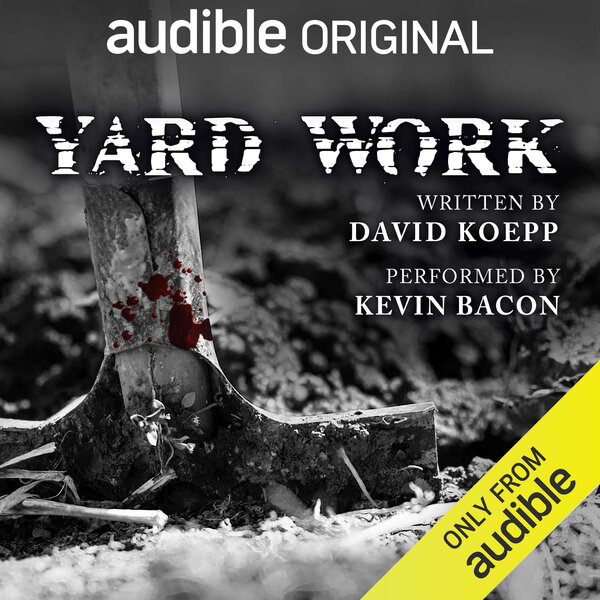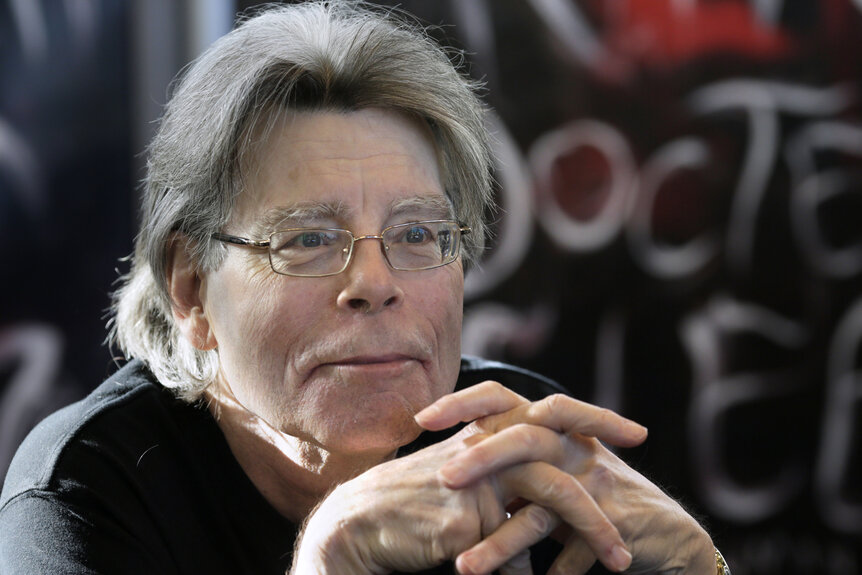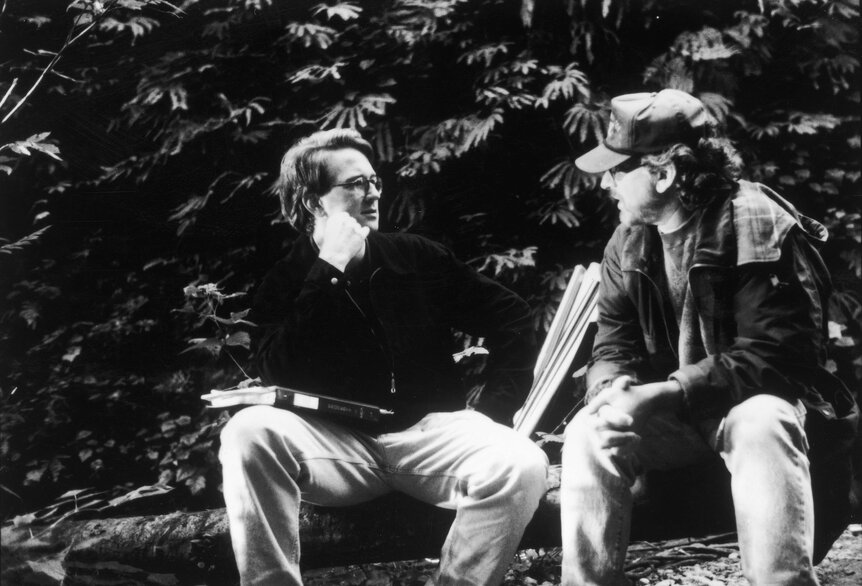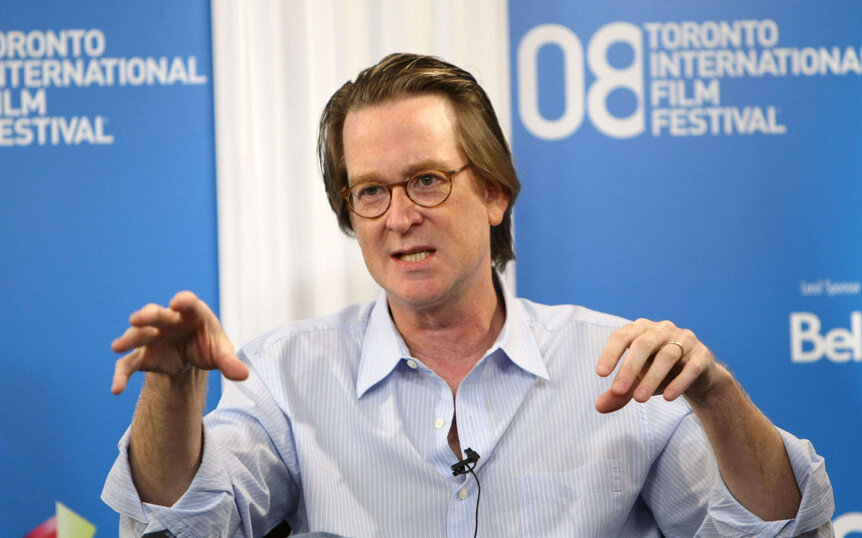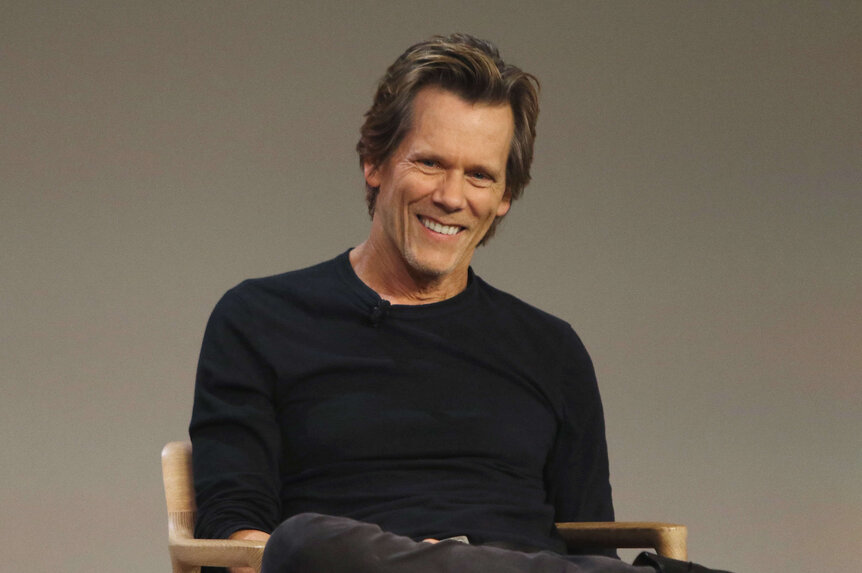Create a free profile to get unlimited access to exclusive videos, sweepstakes, and more!
David Koepp explains how writing Jurassic Park helped him tackle evil plants in Audible Original Yard Work

In 1993, screenwriter David Koepp made us all jump by bringing dinosaurs to life with his script for Steven Spielberg's Jurassic Park. In 2020, Koepp wants to make us all jump with the arrival of killer plants in his new Audible Original, Yard Work. On sale today, the horror novella (which SYFY WIRE exclusively previewed on Friday) is about an 88-year-old Wisconsin judge who goes to war with an invasive species of vine — a genuine botanical anomaly — after the unexpected death of his wife, whom he always assumed would outlive him.
The more he attempts to remove the tree-throttling growth, the more the judge comes to realize that the vine may have a mind of its own, and what's more, it may actually be planning to kill him. That fact becomes rather apparent when the heinous weed takes root in his own body, a plot beat that infuses the story with a stomach-turning visual out of a 1980s body horror flick. It's a creeping tale of mortality with a lesson about the futility of trying to swim against Mother Nature's forceful tide.
Kevin Bacon, who recently worked with Koepp on You Should Have Left, takes up narration duties for the two-hour production that will make you cast a shifty-eyed glance up the trees in your yard to make sure they haven't been overtaken with alien vegetation. In fact, you may want to sleep with a pair of shears under your pillow from now on.
To get a better grip on the thorny stem of this new Audible release, SYFY WIRE hopped on a phone call with the gracious Koepp, who was able to draw on past writing experiences (like Jurassic Park and his debut novel, Cold Storage) while working on this project.
**SPOILER WARNING: The following contains spoilers for Yard Work.**
Where did the idea for Yard Work come from?
From my life. Where I live, there’s an agricultural preserve and along the edge of it, it’s filled with trees. They’re filled with, in the last few years, these terrible, invasive vines that blew up the East Coast on Hurricane Sandy. Over the last couple of years, they started pulling the trees down. They’re these ferocious vines and then they started to move into our trees and I said, "Well, I’ll handle this myself."
So I got a couple of pairs of shears and my work gloves, went out, and started cutting and ripping these vines out of the trees. I was unprepared for how ferocious they are and how they have really sharp thorns and they do not want to come out of the trees. I just had this sense of nature fighting me very hard and I had this feeling that: "One of these times, I’m gonna pull this massive vine out of the tree and it’s gonna come out with a mouth at the end of it." I thought, "Oooh, wait! There’s a story!"
It kind of has a Stephen King vibe going on. Is he one of your horror influences?
You can’t write anything scary and not think about Stephen King. He’s great. I grew up reading his stuff, I still read just about everything he writes. He’s fantastic. I grew up in a small town in Wisconsin on a lake similar to the character in the story. But what I liked about King’s stories was that people seemed to live in towns like I did. Those small towns in Maine felt a lot like my small town in Wisconsin. The fact that interesting, horrifying things were happening to them made me think, "Hey! That’s great! You can tell stories about all kinds of people and they can be kind of like me." So I would describe King as a great big influence.
How much botanical research did you have to do for this story?
Some, but I tried to keep in mind that I wasn’t writing a botanical textbook. I think both in prose and in movies, you want the appearance of great proof without necessarily being entirely truthful. Because the truth can sometimes be "very, very boring," as a writing professor of mine once said. In all kinds of writing, I like a "science-y" environment. Because that tends to make things a little more believable. You feel like, "Oh, this is grounded in some kind of reality, even if it’s a heightened reality." And therefore, it’s scarier.
Speaking of a "science-y environment," you also wrote Jurassic Park and Cold Storage. Were you able to apply any lessons from those projects to Yard Work?
Yeah, the value of research, but also the importance of not going overboard with it. Cold Storage is my first novel that came out last summer and what I found writing prose after 25 or 30 years of writing movies, was how freeing it is. And if there’s one thing I love about Audible Originals, it’s that you can write anything you want and you’re not constrained by movie budgets or movie genres or what the acceptable length of a novel is.
You write any length you want, and the Audible projects that I like to listen to are across a great variety of subjects and lengths and numbers of performers. I liked that I could write an 88-year-old man and not worry that a studio was gonna say, "We’re not giving you $30 million to make a movie with an 88-year-old man!" Because then you can project yourself into different kinds of people — people who are not like you. From Cold Storage, I took some of the freedom of writing in prose. And Jurassic Park, happening early in my career, was really a tutorial in telling a science-based story and obviously, I had Michael Crichton’s genius book to work from.
Yard Work is scary, but it puts you in a summery frame of mind, which is nice when we all feel so stuck at home these days. Was that the intention?
That makes sense because it was born in summer. It was one of those summer projects we do, where you get involved in something in the yard and get in over your head. That can happen. I think you can feel the heat in it and as the story goes on, summer starts to wane a little bit, but it’s not quite giving up, so it’s ideal timing to release it.
How long did it take you to write?
The idea occurred to me a little more than a year ago. I find that [for] original things... I tend to get an idea and then it just has to kick around in my subconscious for a good long time. In this case, nine or 10 months. But once I go to write it, I’ve thought it through pretty thoroughly and this isn’t a hugely long story — I think it’s about two hours once it’s read — so I think the writing was probably three or four weeks.
Do you find it challenging to move between prose and screenwriting?
There’s a lot more freedom in prose writing. Movie scripts, you’re really limited to what a character says or does. That’s about it. What’s fabulous about prose and spoken word stories is that you can get into what somebody’s thinking and feeling. In this case, especially because it’s a guy in a cabin mostly on his own, it’s mostly his thoughts and feelings. But 25 to 30 years of screenwriting is hard to leave behind you and so, there is a natural tendency toward visual storytelling. It’s a pretty visual story; he does say and do quite a few interesting things.
But the first thing I noticed when I was writing Cold Storage a couple of years ago is that breaking those rules and being able to digress for a few pages and wander off the subject was really great because you just can’t do that in movies... You just can’t do that in movies unless you’re Quentin Tarantino, who seems to be the master of wandering off the subject for 15 minutes and then coming back to it, and you’re OK with it.
Speaking of your 88-year-old protagonist, you’ve got this guy who sees his wife’s death as an insult to his plans and the eventual war he wages against the vines represents him trying to back some control. Can you talk about defining the main character?
There’s a lot of my dad in him. The judge is 88, my dad passed away when he was 84, but until the very end, he was one of these guys who would insist on doing everything himself, even when it was the worst idea in the world. If he could be standing on top of a teetering ladder to clean out the gutters when he was 83, he would.
I liked that character and as I’ve gotten a little older myself — I'm 57, not so terribly old — [I've started] to understand and project ahead and think, "Oh, I get it. I’m not always gonna be able to do this. I’m gonna start to lose this physical ability or that skill or that freedom. And I don’t wanna give it up a second sooner than I have to!" Especially someone who’s used to being in charge and that’s why I made him a judge. Who [is] more in charge than a judge? Then I liked this idea that he’s planned all this time that he’s gonna be the one to die first and so, he’s created this whole life so that his wife, whom he adores, will have a fine life after him and she’ll have it just the way she wants it to be.
And then she goes first and that is a heartbreaking betrayal by nature. It’s not the way things oughta be, it’s not the way things were planned. I just felt this great empathy for somebody who’s had their plans upended so much by nature and is, therefore, furious with nature and in a battle. This is one thing we all know: that’s a battle we’re not gonna win.
Let’s talk about the gruesome self-surgery scene, where the judge tries to remove an invasive vine that's growing inside his leg. I probably shouldn't have listened to that scene before bed...
I get kind of gleeful about that stuff. My kids find me creepy in that regard. They think I’m a nice guy otherwise, but I think when you get ahold of an idea that’s kind of gross — but mesmerizing or hard to look away — you gotta really dig into it. Literally in this case. You just keep going and you owe it to yourself and the reader to really fully describe it. I think that the reader or the listener wants you to stop, but don’t you dare stop. Go ahead, take this all the way, it’s terrible, but take me through it. And I think that that’s a cathartic thing; we wanna get those things out.
Did you always have Kevin Bacon in mind for the narrator or was it after you two had made You Should Have Left together?
I just wrote this back in March. We had finished the movie and it was getting ready to come out, so we were talking a lot. When I finished [the story] and I knew I needed someone to perform it for Audible, I very naturally thought of Kevin because he’s so gifted. Also, I knew he was stuck at home like all of us, so I felt like I had a pretty shot to get him to agree to do it, and thankfully he did.
Any future collaborations with Audible coming up? Should we expect any more horror stories?
Yeah, I have a few things kicking around in my head, but nothing rooted yet, but I would love to write those [Audible] stories. It’s such a great venue and outlet for different kinds of stories. And I’m working on another book, I hope to be done by the end of the year.
